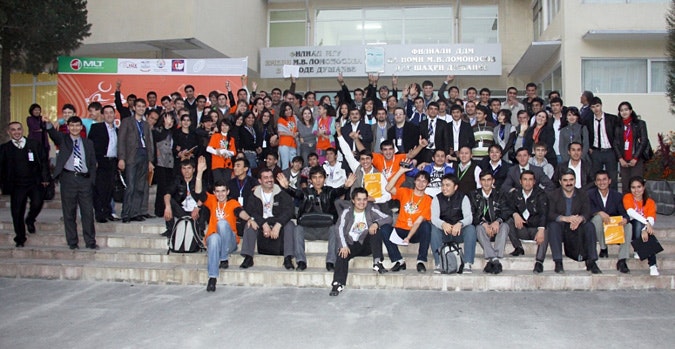Going Digital in Central Asia
By Daniel Zaretsky

The Digital Youth of Central Asia Forum brings together social media pioneers from Tajikistan and other Central Asian countries to discuss and share their projects and innovations. This year's forum in Dushanbe took place at the Moscow State University branch of Tajikistan in October, with over 160 participants from Tajikistan, Kyrgyzstan, Kazakhstan, Iran, and the United States.
The growth of blogs in the region was a central topic. Nuraim Ryskulova, a presenter from Kyrgyzstan, discussed blogging and new media in Kyrgyzstan, introducing to the audience some of the most prominent blogs in the country, including one of the first bloggers in Kyrgyzstan, who has become very popular and created her own brand name. The use of blogs and social media came to a head during the "April revolution," when youth were able to quickly organize themselves to offer security and relief services. Tolkun Umaraliev lectured on blogging in Uzbekistan and covered the laws on mass media, popular blogs, and how one could start their own blog or join that country’s community of bloggers.
Other presentations included the topic of e-learning in Kazakhstan, Kyrgyzstan, and Tajikistan. Barriers to e-learning include lack of knowledge of English and perhaps even Russian, entrenched traditions which favor face-to-face learning, lack of distance education experts and tutors, and a lack of access to information and communication technologies—including the Internet—due to location and cost.
Presenters noted online trends in the region—for example, girls outside the major cities are not using the Internet as much as boys—and potential cost savings: accessing free news instead of buying newspapers, downloading free videos instead of buying DVDs, using free email programs instead of paying for phone calls, and tapping into online libraries instead of buying books.
Topics focused on enhancing education including creating e-portfolios for university students, developing a network school in rural eastern Kazakhstan, using social media as a teaching tool in Kyrgyzstan, and a new DVD that teaches users the Tajik alphabet and Tajik vocabulary. A presenter from the United States talked about the benefits of online learning and about the process of setting up online distance learning centers in Tajikistan. He demonstrated Internet courses that can help students learn English and other languages as well as preparing for TOEFL and other standardized tests.
Nona Lambert, a graduate student at the Fletcher School of Law and Diplomacy at Tufts University, presented "An Introduction to Crisis Mapping." The presentation focused on how volunteers using open source software have collaborated online to respond to disasters. Lambert highlighted a specific case of how student volunteers processed tens of thousands of SMS messages from Haiti after the January 2010 earthquake on a public Ushahidi map. Lambert concluded with local examples of Ushahidi being used in the region and tips for running a successful crisis mapping project.
Overall, the Digital Youth of Central Asia Forum broke down geographic barriers. Participants and presenters from the regions of Tajikistan and from other Central Asian countries were not only able to network, but to learn from each other about new innovations which they can directly apply in their own countries and regions.
Daniel Zaretsky is general director of Knowledge Across Borders.